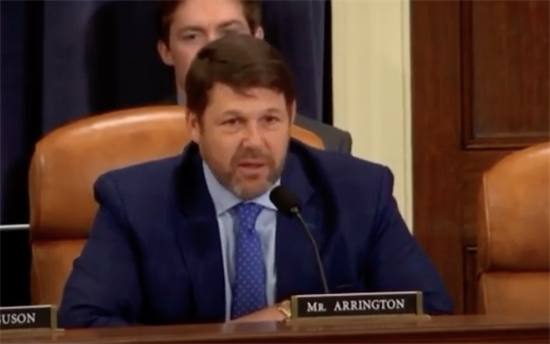Press Releases
ICYMI: Arrington: Trade Is Not a Priority for President Biden
Washington,
March 27, 2023
WASHINGTON D.C. – Last week, Rep. Jodey Arrington (TX-19) participated in a House Ways and Means Committee hearing considering the Biden Administration’s 2023 Trade Policy Agenda. To watch Rep. Arrington’s remarks, click here. Remarks as Delivered Rep. Arrington: I thank the Chairman and Ambassador Tai, good to see you. I feel for you every time I see you, and we have this opportunity to have a conversation especially because it’s public. I want to be kind and polite and sweet, like my people back in West Texas, but people are also brutally honest, and they feel like that is the only way that we’re going to accomplish anything if we’re honest and direct. I don’t see any action out of the presidency – out of the White House and under his leadership, President Biden – that demonstrates that trade is a priority. We’ve worked with you as a former Ways and Means staff person; I think I know what you’re inclined to do. I think I know that you believe that trade is critically important, not just to agriculture, which is very trade dependent, and it is the lifeblood of the region that I hail from, but you understand how important it is to the overall U.S. economy and our future growth. For all of President Trump’s shortcomings, and for all the reasons some people weren’t crazy about his personality or his leadership style, President Trump was totally committed to trade and Lighthizer had a boss who made trade a priority, and the people we were doing trade with, other countries, took him very seriously. That’s why we were able to come together in a bipartisan way and actually accomplish something for the United States, for our workers, for our producers and manufacturers. I hate that you don’t have that because I think it’s wasted talent. I hate it more for the country because we’re getting whipped on the playing field. I can’t stand to see America lose when the game is rigged, when people are cheating, but worst of all, when we don’t even show up to the game. That’s how I feel about where we are today. China and just about every other competitor country is taking market share every day from the United States and from our great farmers, ranchers, manufacturers, etc. It’s because we do more talking than we do making deals and having real substantive agreements that will improve our economy and our situation. Do this for me, it would be helpful, because I’m the Budget Chair now and we’re looking at the various ways to get our debt-to-GDP down, because that’s a threat to everything – our total economy, our security, our future. Quantify for me – this is not a gotcha question, it’s just a broad-based question about the impact of trade to our economy and to our growth. Can you just speak briefly to that? How important is trade to growing our economy? Ambassador Katherine Tai: I’d be delighted to. And Mr. Arrington, I’d like to let you know, I wasn’t in West Texas recently, but I did make a trip to Houston and got to go to the rodeo. It was really quite something to see. So in terms of the spirit of your people in Texas across the board, I got to see something there and there are aspects of the hearing today that remind me a little of what I saw on the rodeo. Rep. Arrington: Probably the calf scrambles. Ambassador Tai: A different format. Let me speak to your specific question. Let me put it this way. Trade has the potential to be a tremendous tool for growth and development if it is done the right way. We have pursued trade policies that have expanded the pie certainly if you want to look at the GDP and from your budget perspective. But what we have found over time – and we have a USIDC report to back this up – the way we’ve pursued our trade policies is focused too much on the big picture and the distributional effects of trade. We’ve seen that the benefits have clustered in certain places, and they’ve not flowed broadly enough. And so what you see, in terms of our trade policies now, are to try to bring corrective aspects to trade by continuing to do trade but by continuing to push ourselves to do it better. Rep. Arrington: Thank you, and I’m out of time to comment so I won’t. ### |


